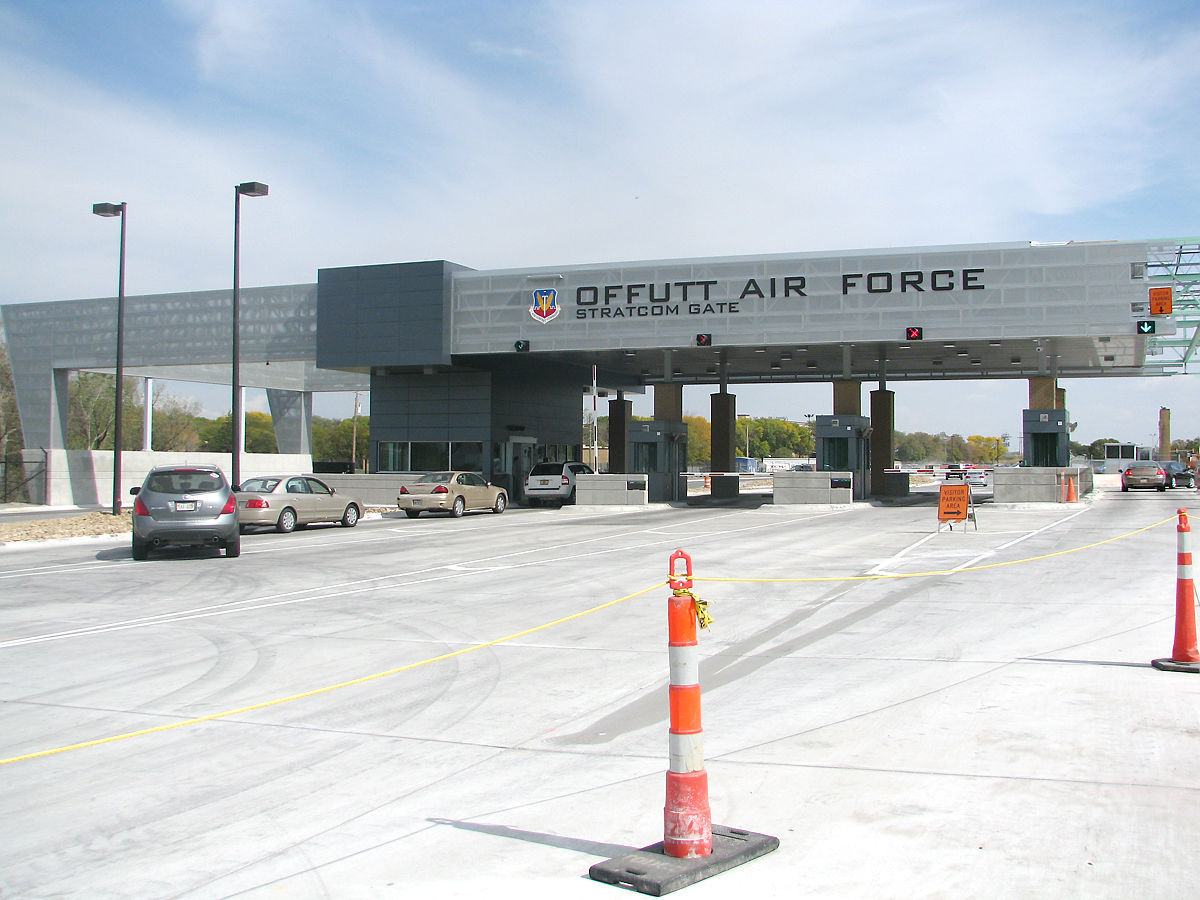Military Law Enforcement Personnel Can Now Carry Their Own Guns onto Offutt Air Force Base
By Steve Liewer, Omaha World-Herald staff writer,
Feb 6, 2017

The Stratcom Gate at Offutt Air Force Base off Capehart Road in Bellevue.
Certain current and former military law enforcement personnel now may carry their personal firearms onto Offutt Air Force Base under a new 55th Wing policy.
The rule took effect Jan. 11 after nearly a year of planning and consideration and was not tied to any specific security threat against the base, said Lt. Col. Ian Dinesen, commander of the 55th Security Forces Squadron.
“We wanted to make sure it was very well-thought-out,” Dinesen said.
The new rules are allowed because of the 2014 expansion of a then-10-year-old federal law, the Law Enforcement Officers Safety Act, to allow military police with special permits to carry concealed weapons.
A post on Offutt’s Facebook page said the purpose was “to enhance existing force protection measures and potentially mitigate active-shooter or workplace violence events.”
In recent years, military posts have been the site of several mass shootings, including a 2009 terrorist attack by Nidal Hasan, an Army psychiatrist, at Fort Hood, Texas, that killed 13 soldiers and wounded more than 30; a spree at the Washington Navy Yard in 2013 in which a gunman killed 12 people and wounded four; and a second Fort Hood shooting in 2014 in which a distraught soldier killed three and wounded 16.
It may be counterintuitive to civilians, but military bases — including Offutt — have strict rules against carrying weapons. Only on-duty security officers may bring them on base. No one, not even someone with a concealed-carry permit, is allowed to bring personal weapons onto base, Dinesen said, except to carry them to and from an on-base residence, or to a firing range. In those cases, they must be carried unloaded, inside a locked case.
The federal law originally was passed in 2004, in the wake of the Sept. 11, 2001, terrorist attacks, to create a sort of auxiliary force of highly trained weapons specialists who could respond quickly in such emergencies, said James Baranowski, manager of external and international affairs for the National Rifle Association.
The law, widely known by the acronym LEOSA, allows qualifying law enforcement officers to carry permitted weapons across state and other jurisdictional lines.
It created a sort of back-door form of “reciprocity,” an NRA-backed concept that allows holders of concealed-carry permits in one state to legally carry their weapons in every state.
“It’s certainly helped a lot of law enforcement officers, especially in states that are more restrictive of civilian carriers,” Baranowski said.
But the law was poorly drafted, he said. Some language in the law appeared to exclude military security officers.
Congress amended the law in 2010 and again in 2014, the latter time specifically allowing military police and law enforcement officers to qualify to receive the special LEOSA identification cards.
Since then, the Army and Air Force have issued guidelines to allow their current and former security officers to qualify for the ID cards. The Navy, which also has administrative authority over the Marine Corps, has not.
Just over a year ago, the Air Force also gave base commanders authority to allow military LEOSA cardholders to carry their weapons onto bases. Baranowski said he thinks Offutt is among the first bases to do so.
The cards still aren’t easy to get. Only airmen or veterans with more than 10 years of experience as military security officers may qualify. They must go through stringent recertification training each year and pay a fee of up to several hundred dollars a year.
“You’re talking about people with quite a bit of service under their belt, even to be considered,” Dinesen said.
Cardholders also must secure their weapons and declare them at the gate before their vehicle is screened.
Even with the rules change, many major buildings and offices at Offutt will remain off-limits.
“I can’t carry it right now, sitting in my office as the squadron commander,” said Dinesen, who has one of the permits.
Nationwide, about 1,180 current and former Air Force security officers have qualified for LEOSA permits. Another 200 have applied and are waiting for certification.
Dinesen said about two dozen have filed permits with his security office.
“There’s really not a whole lot of people carrying,” Baranowski said.



